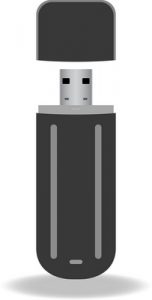 Small, important, easily lost… how can you keep your USB flash drive safe?
Small, important, easily lost… how can you keep your USB flash drive safe?
A USB flash drive is a very useful piece of tech in this day and age of computers. Their storage space has increased while cost has gone down, so most people have a least one. All of your needed files, right in your pocket or on your keyring. Anywhere you go – a library, an office building, or a relative’s house – will most likely have a computer you can use and a USB drive is like carrying a hard drive without having to carry an entire computer tower or laptop.
With all this freedom, where you go can have its own risk. Theft, corruption., For example, you might lose your USB drive or have it stolen, giving access to all your private files to whoever has the stick.
Password-protect your USB
Our first tip is the first line of defense in protecting your USB’s data. There are many ways to have a password on your USB. You can use Word and Excel to add passwords to individual documents or use programs like USB Safeguard to protect the whole USB with a password. If you are having both private and work-related information on your USB flash drive, you should have it password-protected immediately to make sure you and your work is not compromised.
Run your programs off of a USB instead of downloading them
Did you know you can run programs from your USB stick? You can! Though it might take longer because files have to transfer back and forth from the USB and the computer. Not all programs will properly run from the USB flash drive, but sometimes, it might be worth it to run a program from your USB so the computer does not have a copy of your program. This is especially useful if you’re only allowed so many copies of a program or the other person is not allowed to see the program you are using.
Found a USB flash drive somewhere? Don’t use it!
Do not use abandoned USB flash drives! Do not under any circumstance use a USB flash drive when you do not know where it came from and who owns it. It has become a more common practice for hackers to leave USB sticks outside or in a building for others to pick up and plug into their computers. This method has had the military compromised in the past, because the curiosity of what is in the USB Flash Drive was too much to not check. Additionally, some people may think, “Awesome! Free USB!” … that is, until their computer is compromised by malicious files. Learn from the mistakes of others and don’t use USB sticks that you don’t know the origin of.
Suspect an infection? Reformat.
If you ever suspect that your USB stick is infected or has corrupted files, it is a good idea to reformat the USB stick so you can still use it as though it were new. This will remove all the data and essentially factory-reset the device, so be wary when formatting.
If you lose your USB flash drives often, try a lanyard
If you find yourself always leaving behind your USB sticks, invest in a USB lanyard for your neck or your wrist. Pick out a bright one and it will make them harder to forget when they either catch your eye or you feel like something is missing.
(Image Source: iCLIPART)

